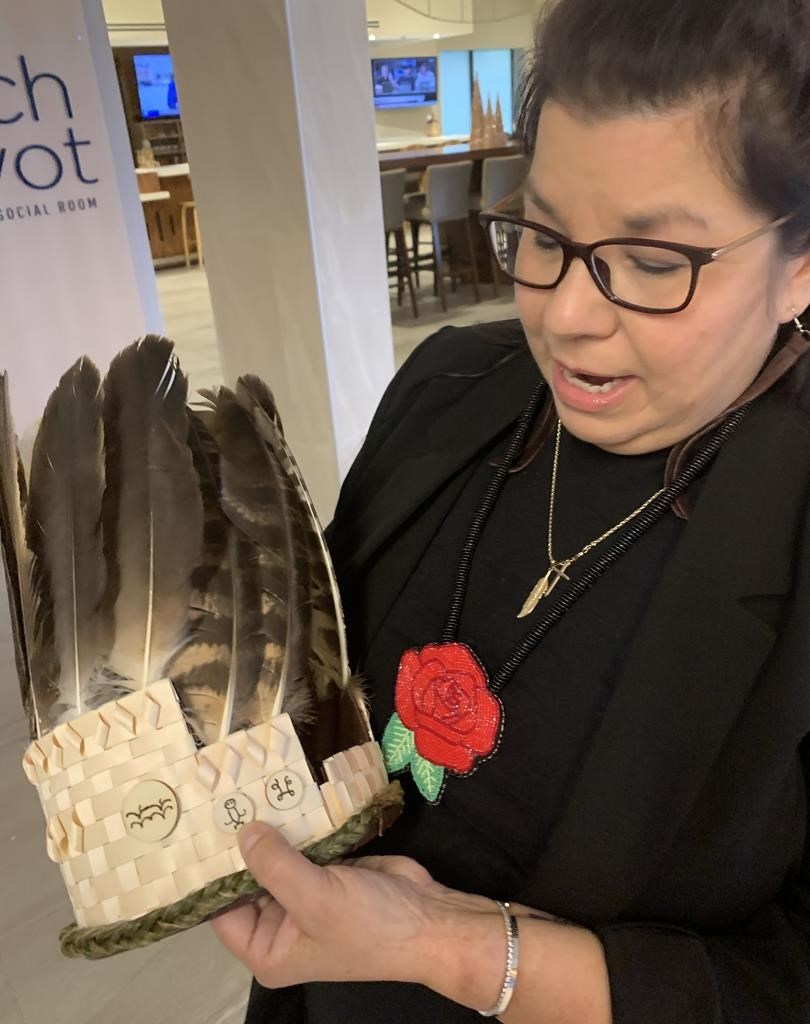DARTMOUTH, N.S. — A Nova Scotia Mi'kmaq leader swore the oath of her new office on Thursday, wearing a headdress with hieroglyphics that evoke her life and passions.
Andrea Paul, the recently elected regional chief of the Assembly of First Nations for the province, explained during her induction ceremony the symbols were laden with meaning, including reminders of her time as chief of Pictou Landing First Nation.
There is a symbol indicating the water, and another the Mi'kmaq people as a whole, both suggestive of her successful battle to stop the decades-long dumping of effluent from the Northern Pulp mill into the Boat Harbour lagoon near her community.
Another hieroglyph symbolizes the act of "listening," a skill that Paul says will be the key to her new role representing her people.
"For those who know me well, you know there are things I am passionate about: the environment, water, my grandson ... but most of all the Mi'kmaq people," she said, her finger pointing to the hieroglyphs as she spoke.
The headdress with 13 feathers — one for each community — was woven recently by basketry artist Shanna Francis of Membertou First Nation, who had asked Paul for the messages she wanted to convey.
"She called and asked me 'What's your story and what's important to you?'" said Paul, adding she had forgotten to tell the artist to include "education" — her career before taking on leadership of Pictou Landing. "But it (the headdress) is a living piece of art, and something we can continue to add to," she said.
Ralph Francis, Paul's uncle, said in an interview he found it emotional to witness the induction of his niece, who he helped care for when she was young.
"She got us through a lot of hard times and she's been the one on the forefront fighting for our rights," he said.
The first woman to hold the position, Paul swore an oath to "support the well-being and the best interests of the chiefs of Nova Scotia," while in office for the next three years.
"I want to be part of seeing real movement and positive change for our communities and all of our Indigenous sisters and brothers," she said during her speech.
Paul, who served as chief of Pictou Landing for 12 years, has replaced Paul Prosper, who was appointed to the Senate in July.
Paul gained national prominence during her time leading Pictou for her voice calling for the end of the pumping of effluent into the lagoon near her community. The mill closed in 2020 after then-premier Stephen McNeil refused to allow the treatment facility to continue to operate past a legislated deadline. A Crown corporation is working on a plan to clean up the site.
Francis said she has made four headdresses for female chiefs at her store, Kisitaqn Basketry. "It is very emotional and very powerful to bring their vision to life," she said in an interview after the ceremony.
"It's not my vision. It's their story and I just put it together."
This report by The Canadian Press was first published Nov. 30, 2023.
Michael Tutton, The Canadian Press



